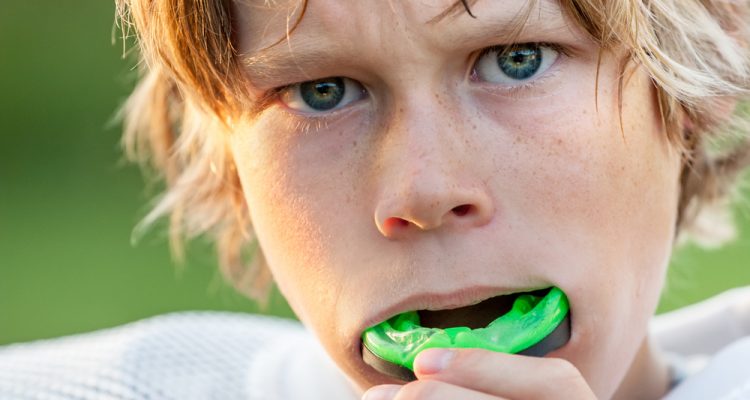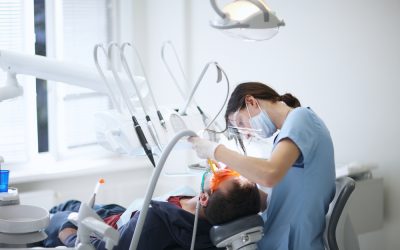According to the National Youth Sports Safety Foundation (NYSSF), dental injuries are the most common type of facial injury sustained during sports. In order to lower the risk of oral injuries caused by direct trauma to the face, all athletes need to wear a mouthguard during sports practices and games. This time of year, young athletes all over the country are trying out for soccer, basketball, and football in their schools. And as the weather starts to cool, adult athletes will be joining community leagues for sports as well. But before the first whistle blows, athletes need to be equipped with the right protection to prevent injuries.
Mouthguards are thin, flexible plastic structures that protect the teeth and jaw. Most mouthguards are fitted only over the upper teeth. For the best protection, a mouthguard should be tear-resistant, durable, and properly fitted so that it does not restrict breathing or speaking.
Who Needs to Wear a Mouthguard?
All athletes need to wear a mouthguard to protect their mouth and teeth. This includes children who play organized sports and adults who play in community sport leagues. The NYSSF states that youth athletes who don’t wear a mouthguard are sixty times more likely to sustain damage to their teeth.
A mouthguard needs to be worn during practices and games for collision or contact sports like football, boxing, wrestling, field or ice hockey, basketball, baseball, softball, soccer, volleyball, lacrosse, and rugby. Today, experts recommend that even athletes in sports like gymnastics have a mouthguard, to protect their teeth in the case of an unexpected fall. Some sports – like boxing, wrestling, and football – require athletes to wear mouthguards, due to the high likelihood of sustaining contact injuries.
How Does It Protect the Mouth and Teeth?
According to the American Dental Association (ADA), more than 200,000 oral injuries are prevented every year by wearing a mouthguard. If you play any contact sport, dental injuries are common after sustaining direct trauma to the face. Here’s how a mouthguard can help reduce the risk of injury from getting hit in the face while playing sports:
- It will protect teeth from becoming chipped, cracked, fractured, broken, or dislodged. Mouthguards also protect crowns, bridges, fillings, and other dental work from becoming broken or damaged.
- It will prevent the gums, cheeks, tongue, and lips from being cut or lacerated by sharp tooth edges. Without a mouthguard, facial trauma could cause serious pain and damage to the soft tissues in the mouth.
- It will keep the teeth and jaw in proper position. After a direct hit to the face, a mouthguard absorbs the shock of the blow and distributes the force of impact along its entire structure. This ensures that no individual tooth will absorb the full force of a direct hit. Mouthguards also ensure that the jaw doesn’t become fractured by taking on the full pressure of a blow.
Types of Mouthguards
There are three types of mouthguards:
- Stock mouthguards can be found in most sporting goods stores. They are the least comfortable and least protective structure. Athletes must bite down on the plastic constantly to hold the piece in place in the mouth.
- Boil-and-bite mouthguards can be found in most drugstores and sporting goods stores. They require some DIY work: the plastic is boiled for thirty-sixty seconds, a mold is created by biting down on the plastic, and then the piece is placed in ice water to harden it into shape. The boil-and-bite method may require several attempts to get a proper fit.
- A custom mouthguard is made specifically to fit an individual mouth. A dentist or orthodontist will custom make the piece in their office. This is the most protective type of mouthguard, but it’s also more expensive than ones found in stores.
For information on how to care for a mouthguard, read more here.
Compared to the costs of repairing a fractured tooth or jaw, mouthguards are an inexpensive preventative measure to protect youth or adult athletes from dental injuries during sports. Before fall sports kick off, contact Boyett Family Dentistry for more information on custom-made athletic mouthguards.





